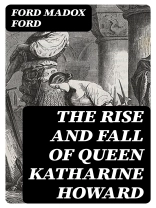In ‘The Rise and Fall of Queen Katharine Howard, ‘ Ford Madox Ford constructs a richly textured narrative that chronicles the tumultuous life of one of Henry VIII’s most controversial wives. Through a masterful blend of historical precision and psychological depth, Ford delves into Katharine’s youthful exuberance and tragic downfall, employing a lyrical style imbued with poetic imagery and intricate characterizations. This novel resonates within the broader context of Ford’s oeuvre, which often explores themes of love, betrayal, and the complexities of human relationships, reflecting the moral and political tumult of 16th-century England. Ford Madox Ford, a pivotal figure in the literary modernist movement, drew from his diverse experiences and profound knowledge of history to impart authenticity to Katharine’s story. His own life was marked by a keen interest in historical narratives and a deep understanding of human nature, which informed his exploration of the anguish and ambition that defined Katharine’s existence. Ford’s background, including his connection to fellow writers of the Bloomsbury Group, underscores his commitment to elevating historical fiction through a modern lens. This compelling work is recommended for readers who are interested in the intersection of history and literature, particularly those who appreciate nuanced character studies and the intricate dynamics of power and femininity. Ford’s evocative prose and profound insights into the human psyche offer a captivating portrait of one of history’s most enigmatic queens, making this novel a must-read for both literary enthusiasts and history buffs.
Circa l’autore
Ford Madox Ford, born Ford Hermann Hueffer on December 17, 1873, and known for his prolific writing and influential literary editorships, was an English novelist, poet, critic, and editor, whose legacy includes a vast array of literary contributions. Ford is particularly remembered for his role in promoting Modernist literature and for his own experimental narrative techniques. His reputedly most acclaimed series, ‘Parade’s End’, reflects Ford’s deep exploration of the tumultuous social landscape of World War I-era England. Ford also authored ‘The Good Soldier’ (1915), widely considered a masterpiece for its use of the unreliable narrator and its intricate exploration of social mores. ‘The Rise and Fall of Queen Katharine Howard’ provides yet another glimpse into Ford’s fascination with history and his skill in blending historical figures with a literary narrative that affords them a fresh perspective often not found in traditional historiography. Ford’s literary style often embodied an impressionistic approach, drawing deeply from his personal experiences and observations, while his work as an editor allowed him to shape and influence the trajectories of other modernist writers. Ford lived through eventful periods that saw the transition from Victorian to Edwardian approaches in literature, and his work was thus a bridge linking the eras, as well as a conduit for new ideas in fiction.












